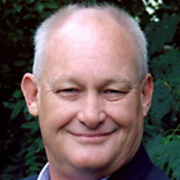
Sean Duffy
Multi-skilling is close to a job requirement in New Zealand's relatively compact screen scene. Sean Duffy has done his share. For two decades he balanced work as an actor and editor, before calling the shots as director.
An actor since childhood, Duffy's extended screen CV includes many diamond-in-the-rough characters, often working in law enforcement. He is probably best known for two roles. Willy Nilly, the first, marks a rare time Duffy has done comedy on screen. First made as a short film in 1998, it was later reborn as a TV series that went to three seasons. Duffy played Eric, joining Mark Hadlow as country bumpkin brothers who attempt to negotiate life, after the death of their mother. "I got the best comedy actor award for that," recalls Duffy, "but I always thought Mark should have got it in a way. I felt I was more his fall guy."
The other role is hit 80s police series Mortimer's Patch, which still ranks as one of Duffy's favourite screen experiences: "I think because I was so new to it and I was learning so much from some pretty seasoned actors who were around me — Terence Cooper and Don Selwyn and Bruce Allpress." Duffy played smalltown rookie 'Dimp' Gilchrist, to Cooper and Selwyn's more experienced policemen.
Policemen have long been Duffy's stock in trade — in Mortimer and spin-off movie Trespasses, in TV series Plainclothes and Orange Roughies, in movie Never Say Die and in Tiger Country, a tele-movie he considers a lost opportunity, partly because he was so sick when it came to shooting time. In Smash Palace his off duty policeman has a memorable pub face-off with Bruno Lawrence. In the classic Utu he plays a soldier who has an unfortunate encounter with Zac Wallace in the first few minutes.
But the variety has been wide: Aside from his blink and you'll miss it screen debut, leering at a woman in a pub scene from Moynihan, he was a barber in short film The Day Morris Left, sidekick to the villain in the comic-strip inspired Terry and The Gunrunners, guest starred as a dysfunctional husband on Country GP, and spent 18 weeks playing a "ratbag" drugdealer on Gloss.
Another personal favourite was cult Matt Bowkett comedy The Neighbourhood Network (1994). Duffy won a screen award for his acting — playing a man attempting to run an access television station — but fears the show may have been a little ahead of its time.
Duffy's own television career started back in 1970, the year he joined the New Zealand Broadcasting Corporation. Soon he made his way into the editing room, initially to splice commercials directly into programmes, hoping the splices wouldn't break when the results went on air.
News, current affairs and other non-fiction programming would be the main orders on his editing menu. Duffy alternated acting roles and editing work all the way through to 1989, when a new phase of his career began. That was the year Keith Slater asked him to join new channel TV3, as associate producer on news show A Current Affair. Working as a field director, Duffy took to it like a duck to water. "... I'd spent 18 years on and off in a dark room looking at other people's mistakes, so I knew exactly what I needed to do."
Bruce Morrison soon pulled him onboard to direct multiple episodes of Gary McCormick hit Heartland. Duffy and McCormick would reconvene for further shows, but the one Duffy remembers most avidly is McCormick Rips. Originally the intention was to parody McCormick's on-screen persona through a mixture of mockumentary and live material; Duffy and McCormick were filmed trading insults and witticisms as director and star. But Duffy feels the show's genre-bending possibilities were emasculated before it went to air. The show was canned after two episodes.
Duffy directorial CV also includes arts show The Big Art Trip, award-winning series Wild About New Zealand and three seasons of Police Ten-7. He helped break a story on party pills containing restricted substances while directing 2006 series The Truth Files , and spent seven months investigating life inside Rimutaka prison for Locked Down, which finally aired in a late night slot. These days Duffy has left television behind — though he keeps his hand in creative matters by teaching acting at Auckland's Corelli Arts School.
Profile published on 12 November 2012
Sources include
Sean Duffy
'Sean Duffy: from cop shows to comedy' NZ On Screen website. Director Andrew Whiteside. Loaded 12 November 2012. Accessed 12 November 2012
Trisha Dunleavy, Ourselves in Primetime — A History of New Zealand Television Drama (Auckland University Press, 2005)